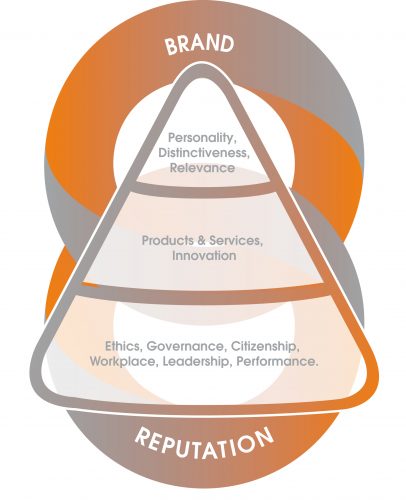
Communications Directors – you need to get a handle on Brand
An organisation’s Brand and its Reputation are both proven to contribute to its value and be fundamental to its long-term success. Thus, it follows that they should work in lockstep together.
However, the disciplines of Brand management and Reputation management have developed quite separately, each traditionally being controlled by different functions in an organisation: Brand tending to be the domain of Marketing, Reputation that of Corporate Communications or Public Affairs; Brand usually more strategic, Reputation more reactive and/or tactical.
The issue this raises is that the research and strategic planning frameworks that have developed to understand, support and guide Brand and Reputation rarely consider both together, despite evidence which shows that – at the very least – they are related.
Recently, here at Tovera, we have seen a shift in responsibility for corporate brand planning. More and more the corporate communications leader is being tasked with briefs to define things such as ‘purpose’ or ‘corporate narrative’ – which we’re finding are either other words for, or aspects of, the corporate brand and as such, require a brand planning approach.
The danger here is that these briefs are tackled in isolation from the corporate brand by corporate communications practitioners who have developed a reputation mindset and approach. At best this can lead to generic or tactical responses that lack the power of distinctiveness and relevance to multiple stakeholders (that the corporate brand requires) or at worst, statements or narratives that work against the corporate brand and not in support of it.
For a successful outcome, corporate communications leaders must bring an understanding (or at least a consideration) of both reputation and brand.
Our own research and experience tells us that Brand and Reputation are related, have influence on each other and are together fundamental to an organisation’s long-term success. Therefore, they are best considered in a single research and planning framework for analysis in order to understand the drivers of both on the desire for stakeholders (including customers) to give their positive support to an organisation.
Within our framework, we envisage the Reputational aspects as a strong, weighty foundation – mostly made up of corporate behavioural aspects (such as ethical underpinning, operational soundness, clear leadership and strategy) that provide license to operate and resilience to crises. This gives the corporate Brand a combination of firm roots and stability. The Brand is the distinctive, relevant promise to the customer and stakeholders made up of products and services that meet a clearly defined need (or meet a defined need in a different way) and that is recognised as having its own unique personality.
Balance is required. If the organisation’s Brand is strong and distinctive but its Reputation is weakly rooted, the Brand could be undermined, not having the necessary support from all its stakeholders. If the Reputation is strongly rooted in important (but generic) aspects but the Brand proposition is unclear or not distinctive, the whole Corporate Brand could lose, or fail to gain, traction in the marketplace. Either scenario could lead to a loss of support from customers and/or stakeholders, and ultimately result in an erosion of organisational cohesion and value.
We recognise this can be a lot to get one’s head around. And in today’s fast-paced world there’s a temptation to oversimplify these concepts. But strategic planning, done properly, requires and deserves deep thinking and analysis. Our Brand and Reputation approach has been more than 7 years in development. So, if you are a Corporate Communications or Public Affairs leader being tasked with strategic briefs, let us know. At the least we can send you our Brand and Reputation white paper that gives more background to our thinking. At best we’d be happy to support you with the strategic planning.

